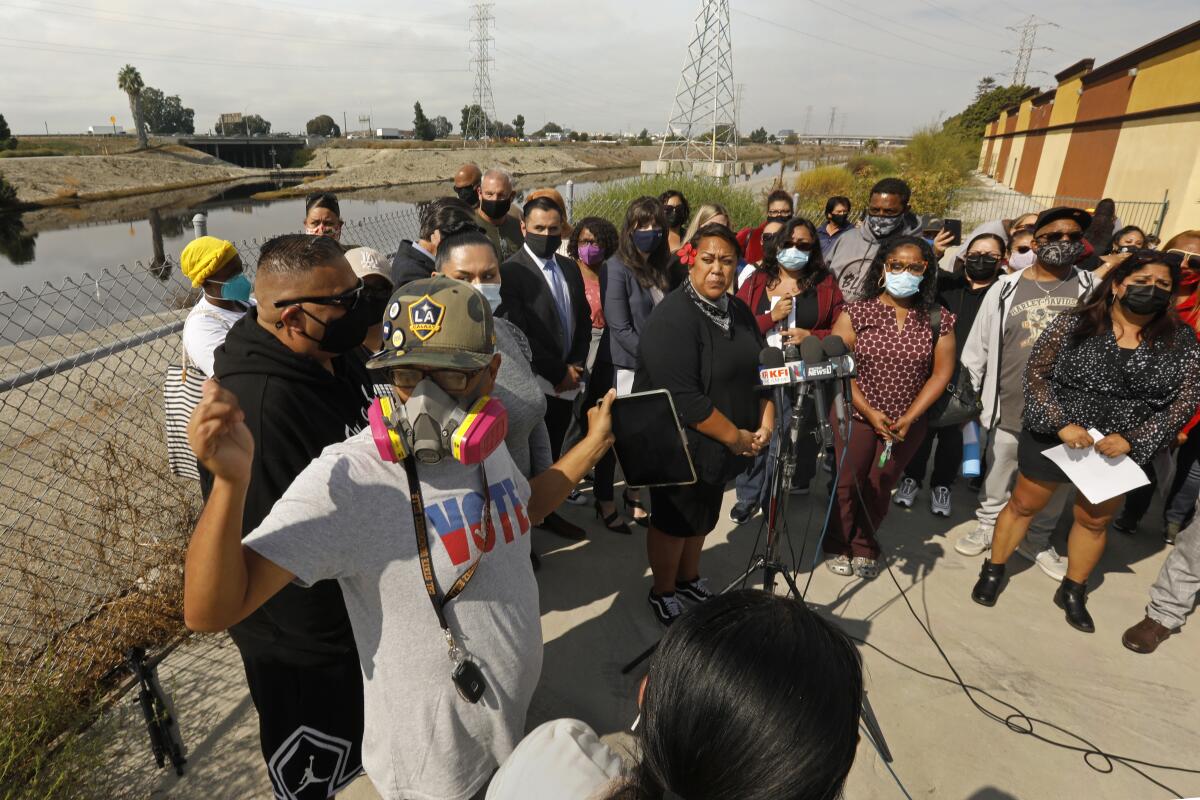Thereâs no telling when the nasty smell in Carson will be gone, county officials say

Three weeks after a foul smell began plaguing Carson residents, Los Angeles County officials say they canât predict when it will dissipate.
Some residents are so fed up that they have filed a lawsuit alleging a warehouse fire caused a buildup of decaying vegetation in the Dominguez Channel, leading to the smell.
For the record:
2:14 p.m. Oct. 22, 2021In an earlier version of this article, the director of Los Angeles County Public Works was misidentified as Mark Pastrella. His surname is Pestrella.
After crews finally began spraying a biodegradable neutralizer last Friday, officials predicted the odor would go away by the middle of this week. Then, they pushed it back to the weekend.
Now, they are not committing to any date at all, citing variations in individual sensitivity to the smell that has been likened to rotten eggs, vomit, body odor or farts.
Levels of hydrogen sulfide, the gas that causes the smell, have decreased significantly since the spraying started, L.A. County Public Works Department Director Mark Pestrella said at a news conference Friday.
The odor should be much weaker by the weekend, Pestrella said, without setting an end date.
âI canât predict when the event will be over for individuals, because each individual has a different sensitivity to hydrogen sulfide gas,â he said.
Public health recommendations have fluctuated too.
Initially, residents were told to close their windows. Health officials said hydrogen sulfide levels were too low to cause long-term problems, though headaches and nausea could result.
But earlier this week, they advised residents not to engage in prolonged outdoor exercise between 9 p.m. and 8 a.m.
Carson Mayor Lula Davis-Holmes said Friday that the failure to provide an end date for the odor is unacceptable.
She also underlined a complaint made by some residents â that a wealthier, whiter community would have received help sooner.
âWe should not have to wait this long for a solution for an odor thatâs from decaying vegetation in a channel,â she said. âHad it been in another city, a more affluent city, I think it would have happened a little faster.â
Carson is 37% Latino, 27% Asian, 24% Black and 7% white, with a median household income of about $82,000, according to the U.S. census.
On Friday afternoon, Carson city officials said they planned to ratify a local emergency proclamation and would demand that the county, state and federal government do the same.
Rep. Nanette BarragĂĄn (D-San Pedro) has asked Gov. Gavin Newsom to declare a state of emergency.
In Carson, a smell like rotten eggs from the Dominguez Channel has been sickening residents for nearly two weeks. Anger is growing.
City and county officials have instituted reimbursement programs for air purifiers and hotel rooms. But getting the money could take weeks.
Pestrella said Friday that the county has booked hotel rooms for residents to escape from the smell, with 26 households taking advantage of the program so far.
Residents who canât afford air purifiers can pick up a free one at Victoria Regional Community Park. he said.
Hydrogen sulfide levels as high as 1,000 parts per billion were recorded near the Dominguez Channel earlier this month by the South Coast Air Quality Management District.
A much lower amount â about 10 parts per billion â is enough to cause adverse health effects, said Jill Johnston, an assistant professor of environmental health at USC.
Hydrogen sulfide is a toxin, and there is little research on the effects of long-term exposure, she said.
âOne of the things thatâs really common is effects on the mucus membrane, the eyes, nose and throat, which is something weâre hearing a lot of complaints about,â Johnston said. âBut there are also effects on the respiratory system, as well as the cardiovascular system and the gastrointestinal system.â
Workers were initially hampered by a low supply of the biodegradable neutralizer, which breaks the hydrogen sulfide down into a salt.
And they initially made the mistake of spraying at high tide, which washed away much of the chemical.
This week, workers began pumping in water fortified with tiny oxygen bubbles, which prevent the hydrogen sulfide from building up again.
They are also lighting the channel at night, because the bacteria causing the smell may be photosensitive, Pestrella said.
There also are plans to dredge the channel to remove debris from the bottom. But that could be a months-long process, officials said.
Eight Carson residents filed a class-action lawsuit Thursday alleging that a warehouse fire caused the smell.
The warehouse, in the 16300 block of South Avalon Boulevard, stored flammable hand sanitizer in unsafe conditions, resulting in the Sept. 30 blaze, the lawsuit alleges.
Debris from the fire flowed into the Dominguez Channel and clogged it, causing the vegetation buildup and hydrogen sulfide gas, according to the lawsuit.
Art Naturals, the cosmetics company that leases the warehouse, is a defendant in the lawsuit and did not respond to requests for comment.
Jennifer Nelson, a spokesperson for warehouse owner Prologis, which is also a defendant, said the fire did not cause the smell.
The ongoing drought reduced water flow in the channel, so organic matter was not flushed out as usual, creating the hydrogen sulfide gas, county officials have said.
âAs media outlets, including the Los Angeles Times, have been reporting, the odor is related to decaying plants and marine life in the Dominguez Channel because of the drought,â Nelson said.
Gary Praglin, a plaintiffsâ attorney, said the lawsuit asks the defendants to pay for monitoring of residents to see whether serious illnesses develop.
The residents will seek damages for pain and suffering in separate lawsuits, he said.
One plaintiff, Monique Alvarez, is a third-generation Carson resident.
She described the stench as ârotten flesh sitting in the sun.â
Her children, ages 11, 7 and 3, had headaches, coughing and burning in their eyes and throats.
On Oct. 15, Alvarez and her family left for her in-lawsâ home and eventually ended up at a Holiday Inn in Long Beach.
âEven if you sealed all the doors and windows, youâre locked in with this gas,â she said. âItâs scary. Itâs suffocating.â
Times staff writer Andrew J. Campa contributed to this report.
More to Read
Sign up for Essential California
The most important California stories and recommendations in your inbox every morning.
You may occasionally receive promotional content from the Los Angeles Times.













